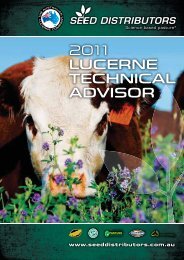Lentil variety sowing guide 2012 - Seed Distributors
Lentil variety sowing guide 2012 - Seed Distributors
Lentil variety sowing guide 2012 - Seed Distributors
You also want an ePaper? Increase the reach of your titles
YUMPU automatically turns print PDFs into web optimized ePapers that Google loves.
Plant Breeder’s Rights A information<br />
and <strong>variety</strong> update for <strong>2012</strong><br />
By Rob Wheeler<br />
and Peter McCormack, SARDI<br />
Key Points<br />
���Most new varieties are protected by<br />
PBR and growers need to be aware of<br />
the implications.<br />
���<strong>Seed</strong> of varieties with PBR protection<br />
can only be bought from the owner,<br />
commercial partner/licensee or an<br />
agent (seed merchant) authorised by<br />
the owner.<br />
���Once purchased, growers can<br />
maintain seed of a <strong>variety</strong> with<br />
PBR protection to satisfy their seed<br />
requirements for the following season.<br />
���Farmers can sell the<br />
products of a protected<br />
<strong>variety</strong> for commercial use<br />
as feed or food (e.g. deliver<br />
to Viterra, AWB, flourmill or<br />
sell as animal feed) unless<br />
bound by a ‘closed loop’<br />
contract.<br />
���Farmers cannot sell, trade or<br />
give away the <strong>variety</strong> for seed<br />
without authorization of the<br />
owner.<br />
���Farmer to farmer trading of seed<br />
without authorisation of the owner will<br />
make them liable to prosecution.<br />
���Commercial marketing arrangements<br />
between the owners and the<br />
licensee can vary between crops and<br />
varieties, and farmers must be aware<br />
of the conditions of the marketing<br />
arrangements.<br />
���Before you take delivery of certified<br />
seed of a new <strong>variety</strong>, you are<br />
encouraged to request a copy of<br />
the paddock inspection report and<br />
the certificate of analysis report.<br />
It is important that you read the<br />
information contained in the<br />
Rob Wheeler<br />
inspection report and the seed analysis<br />
certificate to make sure you are buying<br />
the best available seed.<br />
���When purchasing seed of a PBR<br />
Cultivar you should purchase it in the<br />
name or names of the entity or entities<br />
in which you intend to deliver. You<br />
should retain invoices to prove that<br />
you have entitlement to that seed and<br />
the crop produced.<br />
���If farmers are unsure, they should<br />
seek information from the owner,<br />
commercial partner/licensee or the<br />
selling agent (seed merchant).<br />
This leaflet explains some of the origins,<br />
benefits and restrictions associated with<br />
PBR.<br />
Plant Breeder’s Rights<br />
PBR was introduced to<br />
stimulate private investment in<br />
plant breeding by conferring<br />
ownership rights to varieties<br />
and thereby the potential to<br />
market those rights as part of a<br />
commercialisation process.<br />
The Plant Breeder’s Rights<br />
Act 1994 as amended act<br />
no:148 2002 gives an owner of PBR<br />
the exclusive right to sell, produce or<br />
reproduce, import, export, stock or<br />
condition the seed of a <strong>variety</strong> protected<br />
by PBR (or license another person<br />
or organisation to undertake these<br />
activities).<br />
The rights are similar to patents or<br />
copyright, (these record ownership of the<br />
genetic material) and are administered<br />
under the Act. PBR protection can last up<br />
to 20 years for broadacre crops.<br />
PBR guarantee ownership of a <strong>variety</strong><br />
but do not specify how the <strong>variety</strong> should<br />
be commercialised or whether or where<br />
royalties should be charged.<br />
In the absence of a contract stating<br />
otherwise, farmers can sell the harvest<br />
of a protected <strong>variety</strong> for direct<br />
consumption as food or feed (for<br />
example, deliver it for animal feed or to<br />
a flour mill) but they are not permitted to<br />
sell, trade or give away the <strong>variety</strong> for seed<br />
without the authorisation of the owners<br />
or licensee.<br />
Royalties<br />
���The concept generally referred to as<br />
‘end point royalty’ collection gives the<br />
licensee the right to collect royalties<br />
on harvested grain.<br />
���Increasingly more varieties being<br />
grown by farmers use the ‘end point<br />
royalty’ method of royalty collection.<br />
���Farmers should carefully read<br />
any documentation provided to<br />
be fully aware of the conditions<br />
when purchasing seed of a <strong>variety</strong>.<br />
While the restrictions in the use<br />
of seed under the PBR Act are<br />
clearly defined, other contractual<br />
arrangements may have been imposed<br />
by the licensee following agreement<br />
by the owners. For example, some<br />
contracts specify that the harvested<br />
grain must be delivered to certain<br />
collection agencies; these are<br />
commonly called ‘closed loop’<br />
marketing arrangements or that EPR’s<br />
are on total grain production of the<br />
<strong>variety</strong> excluding seed saved for the<br />
following years production, ‘farmer<br />
saved seed’.<br />
���In some instances growers are<br />
permitted to trade “farmer to farmer”<br />
subject to a three party agreement<br />
involving the farmers and the licensee.<br />
This currently applies to Axe, Correll,<br />
Espada, Estoc, Gladius, Mace and<br />
Scout wheats.<br />
5




